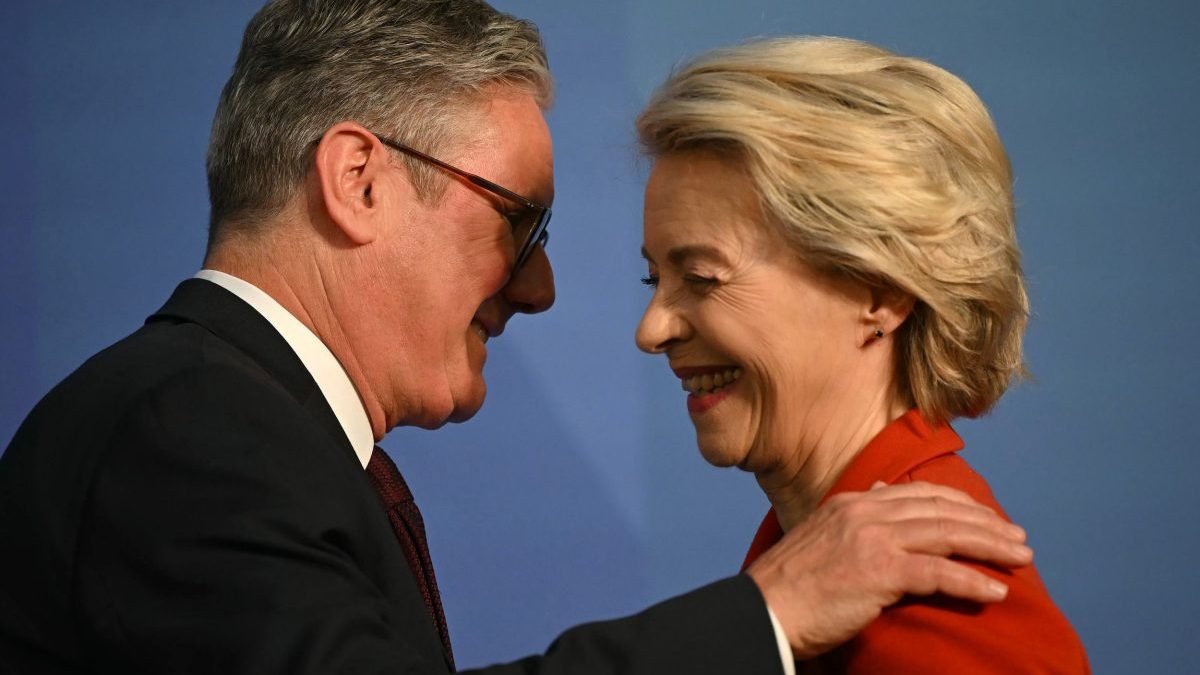Controversial measures to cut legal immigration will allow the UK to make a deal with the EU on youth mobility, The i Paper understands.
Government sources said that any scheme would be compatible with Sir Keir Starmer’s pledge to “significantly” reduce migration, while a European source said the Prime Minister’s vow could make it easier to sell youth mobility to the British public.
On Monday, Starmer will host a UK-EU summit in London as part of his commitment to “reset” post-Brexit relations with the bloc.
A defence and security pact is expected to be announced at the summit, but there will also be discussion of a youth mobility scheme, which would make it easier for under-30s from the EU to study and work in the UK for a limited period, and vice versa.
Such a scheme has been a key demand for Brussels, but there have been fears on the UK side that it would boost migration numbers and prove politically costly.
However, by adopting the policies in the immigration white paper – which Starmer has said will “significantly” reduce overall migration – Labour believe they can neutralise such concerns if the scheme is time-limited and capped.
This would allow the UK to accept a number of young people without it adding to net migration, due to the hoped for large reductions elsewhere.
No return to freedom of movement
Government sources pointed out that Britain would not sign up to a deal with the EU on youth mobility if it contradicted the Prime Minister’s goal to cut migration announced just days earlier.
The sources said that not returning to freedom of movement remained a red line for the Government and pointed out that Britain already has 13 controlled youth mobility schemes with countries such as Australia, New Zealand and Uruguay.
They added that talks with the EU were ongoing and said nothing would be agreed until everything is agreed.
A European diplomatic source meanwhile said that the white paper would not affect the negotiations on youth mobility but suggested it would “be helpful for the domestic argument of the Government”.
While ministers had insisted for months that there were “no plans” for a youth mobility scheme, there have been several high level interventions in recent weeks to open the door to a deal.
Last week, Nick Thomas-Symonds, the minister for EU relations, told the Financial Times that “a smart, controlled youth mobility scheme would of course have benefits for our young people”.
“We will consider sensible EU proposals in this space,” he said.
Thomas-Symonds’ words on youth mobility were then backed by the Prime Minister, who told The Guardian: “We’re pragmatists, and that’s the approach that we bring to these negotiations.”
Asked about the EU talks on Tuesday, the Prime Minister’s official spokesman said: “We’re not going to get into a running commentary on the negotiations. Those discussions are ongoing and nothing is agreed yet.”
The Brexit reset is a pivotal part of the government’s bid to grow the economy.
It came amid continuing fallout from Starmer’s speech on immigration, in which he said the UK was at risk of becoming an “island of strangers” unless the rules on migration are tightened up.
‘Island of strangers’ row continues
Some Labour MPs have claimed the comment was reminiscent of Enoch Powell’s infamous Rivers of Blood speech, in which Powell spoke of Britons being “made strangers in their own country” by immigration.
A source on the Labour left said they were concerned about the effects of Starmer’s rhetoric “on the ground”, warning that immigrants who are “already vulnerable” may be increasingly targeted.
However, a “Red Wall” Labour MP said the language used by Starmer was “very moderate”.
“If you go and speak to people in communities, they are worried that we don’t seem to have any control over who comes into the country,” they said. “Immigration is a public service and it’s broken.”
A poll by YouGov found that 53 per cent agreed with the sentiment of Starmer’s comment, with 26 disagreeing.
On the Powell comparison, the PM’s Spokesman’s said: “The Prime Minister rejects those comparisons and absolutely stands behind the argument he was making that migrants make a massive contribution to our country, but migration needs to be controlled.”
